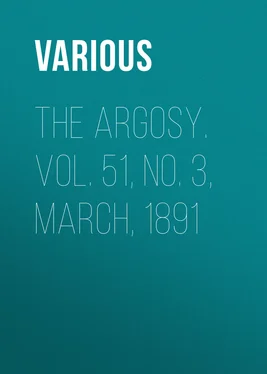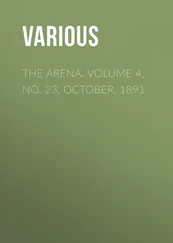Various - The Argosy. Vol. 51, No. 3, March, 1891
Здесь есть возможность читать онлайн «Various - The Argosy. Vol. 51, No. 3, March, 1891» — ознакомительный отрывок электронной книги совершенно бесплатно, а после прочтения отрывка купить полную версию. В некоторых случаях можно слушать аудио, скачать через торрент в формате fb2 и присутствует краткое содержание. Жанр: foreign_antique, periodic, foreign_edu, на английском языке. Описание произведения, (предисловие) а так же отзывы посетителей доступны на портале библиотеки ЛибКат.
- Название:The Argosy. Vol. 51, No. 3, March, 1891
- Автор:
- Жанр:
- Год:неизвестен
- ISBN:нет данных
- Рейтинг книги:4 / 5. Голосов: 1
-
Избранное:Добавить в избранное
- Отзывы:
-
Ваша оценка:
- 80
- 1
- 2
- 3
- 4
- 5
The Argosy. Vol. 51, No. 3, March, 1891: краткое содержание, описание и аннотация
Предлагаем к чтению аннотацию, описание, краткое содержание или предисловие (зависит от того, что написал сам автор книги «The Argosy. Vol. 51, No. 3, March, 1891»). Если вы не нашли необходимую информацию о книге — напишите в комментариях, мы постараемся отыскать её.
The Argosy. Vol. 51, No. 3, March, 1891 — читать онлайн ознакомительный отрывок
Ниже представлен текст книги, разбитый по страницам. Система сохранения места последней прочитанной страницы, позволяет с удобством читать онлайн бесплатно книгу «The Argosy. Vol. 51, No. 3, March, 1891», без необходимости каждый раз заново искать на чём Вы остановились. Поставьте закладку, и сможете в любой момент перейти на страницу, на которой закончили чтение.
Интервал:
Закладка:
Next morning he went to one of the most famous bookdealers in the metropolis. The book inquired for by Ducie was not known to the man. But that did not say that there was no such work in existence. Through his agents at home and abroad inquiry should be made, and the result communicated to Captain Ducie. Therewith the latter was obliged to content himself. Three days later came a pressing note of invitation from Platzoff.
CHAPTER XI
On a certain fine morning towards the end of May, Captain Ducie took train at Euston Square, and late the same afternoon was set down at Windermere. A fly conveyed himself and his portmanteau to the edge of the lake. Singling out one from the tiny fleet of pleasure boats always to be found at the Bowness landing-stage, Captain Ducie seated himself in the stern and lighted his cigar. The boatman's sinewy arms soon pulled him out into the middle of the lake, when the head of the little craft was set for Bon Repos.
The sun was dipping to the western hills. In his wake he had left a rack of torn and fiery cloud, as though he had rent his garments in wrath and cast them from him. Soft, grey mists and purple shadows were beginning to strike upward from the vales, but on the great shoulders of Fairfield, and on the scarred fronts of other giants further away, the sunshine lingered lovingly. It was like the hand of Childhood caressing the rugged brows of Age.
With that glorious panorama which crowns the head of the lake before his eyes, with the rhythmic beat of the oars and the soft pulsing of the water in his ears, with the blue smoke-rings of his cigar rising like visible aspirations through the evening air, an unwonted peace, a soft brooding quietude, began to settle down upon the Captain's world-worn spirit; and through the stillness came a faint whisper, like his mother's voice speaking from the far-off years of childhood, recalling to his memory things once known, but too long forgotten; lessons too long despised, but with a vital truth underlying them which he seemed never to have realised till now. Suddenly the boat's keel grazed the shingly strand, and there before him, half shrouded in the shadows of evening, was Bon Repos.
A genuine north-country house, strong, rugged and homely-looking, despite its Gallic cognomen. It was built of the rough grey stone of the district, and roofed with large blue slates. It stood at the head of a small lawn that sloped gently up from the lake. Immediately behind the house a precipitous hill, covered with a thick growth of underwood and young trees, swept upward to a considerable height. A narrow, winding lane, the only carriage approach to the house, wound round the base of this hill, and joined the high road a quarter of a mile away. The house was only two stories high, but was large enough to have accommodated a numerous and well-to-do family. The windows were all set in a framework of plain stone, but on the lower floor some of them had been modernised, the small, square, bluish panes having given place to polished plate glass, of which two panes only were needed for each window. But this was an innovation that had not spread far. The lawn was bordered with a tasteful diversity of shrubs and flowers, while here and there the tender fingers of some climbing plant seemed trying to smoothe away a wrinkle in the rugged front of the old house.
Captain Ducie walked up the gravelled pathway that led from the lake to the house, the boatman with his portmanteau bringing up the rear. Before he could touch either bell or knocker, the door was noiselessly opened, and a coloured servant, in a suit of plain black, greeted him with a respectful bow.
"Captain Ducie, sir, if I am not misinformed?"
"I am Captain Ducie."
"Sir, you are expected. Your rooms are ready. Dinner will be served in half-an-hour from now. My master will meet you when you come downstairs."
The portmanteau having been brought in, and the boatman paid and dismissed, said the coloured servant: "I will show you to your rooms, if you will allow me to do so. The man appointed to wait upon you will follow with your luggage in a minute or two."
He led the way, and Ducie followed in silence.
The tired Captain gave a sigh of relief and gratitude, and flung himself into an easy-chair as the door closed behind his conductor. His two rooms were en suite , and while as replete with comfort as the most thorough-going Englishman need desire, had yet about them a touch of lightness and elegance that smacked of a taste that had been educated on the Continent, and was unfettered by insular prejudices.
"At Stapleton I had a loft that was hardly fit for a groom to sleep in; here I have two rooms that a cardinal might feel proud to occupy. Vive la Russie!"
M. Platzoff was waiting at the foot of the staircase when Ducie went down. A cordial greeting passed between the two, and the host at once led the way to the dining-room. Platzoff in his suit of black and white cravat, with his cadaverous face, blue-black hair and chin-tuft, and the elaborate curl on the top of his forehead, looked, at the first glance, more like a ghastly undertaker's man than the host of an English country house.
But a second glance would have shown you his embroidered linen and the flashing gems on his fingers; and you could not be long with him without being made aware that you were in the company of a thorough man of the world—of one who had travelled much and observed much; of one whose correspondents kept him au courant with all the chief topics of the day. He knew, and could tell you, the secret history of the last new opera; how much had been paid for it, what it had cost to produce, and all about the great green-room cabal against the new prima donna. He knew what amount of originality could be safely claimed for the last new drama that was taking the town by storm, and how many times the same story had been hashed up before. He had read the last French novel of any note, and could favour you with a few personal reminiscences of its author not generally known. As regarded political knowledge—if all his statements were to be trusted—he was informed as to much that was going on behind the great drop-scene. He knew how the wires were pulled that moved the puppets who danced in public, especially those wires which were pulled in Paris, Vienna and St. Petersburg. Before Ducie had been six hours at Bon Repos he knew more about political intrigues at home and abroad than he had ever dreamt of in the whole course of his previous life.
The dining-room at Bon Repos was a long low-ceilinged apartment, panelled with black oak, and fitted up in a rich and sombre style that was yet very different from the dull, heavy formality that obtains among three-fourths of the dining-rooms in English country houses. Indeed, throughout the appointments and fittings of Bon Repos there was a touch of something Oriental grafted on to French taste, combined with a thorough knowledge and appreciation of insular comfort. From the dining-room windows a lovely stretch of the lake could be seen glimmering in the starlight, and our two friends sat this evening over their wine by the wide open sash, gazing out into the delicious night. Behind them, in the room, two or three candles were burning in silver sconces; but at the window they were sitting in that sort of half light which seems exactly suited for confidential talk. Captain Ducie took advantage of it after a time to ask his host a question which he would perhaps have scarcely cared to put by broad daylight.
"Have you heard any news of your lost manuscript?"
"None whatever," answered Platzoff. "Neither do I expect, after this lapse of time, to hear anything further concerning it. It has probably never been found, or if found, has (as you suggested at 'The Golden Griffin') fallen into the hands of someone too ignorant, or too incurious, to master the secret of the cipher."
Читать дальшеИнтервал:
Закладка:
Похожие книги на «The Argosy. Vol. 51, No. 3, March, 1891»
Представляем Вашему вниманию похожие книги на «The Argosy. Vol. 51, No. 3, March, 1891» списком для выбора. Мы отобрали схожую по названию и смыслу литературу в надежде предоставить читателям больше вариантов отыскать новые, интересные, ещё непрочитанные произведения.
Обсуждение, отзывы о книге «The Argosy. Vol. 51, No. 3, March, 1891» и просто собственные мнения читателей. Оставьте ваши комментарии, напишите, что Вы думаете о произведении, его смысле или главных героях. Укажите что конкретно понравилось, а что нет, и почему Вы так считаете.












